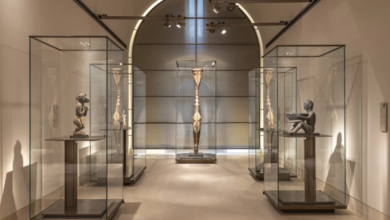Interview Nadia Hathroubi-Safsaf: “We think we know Umm Kulthum, but we don’t”

Almost half a century after her death, she continues to haunt the airwaves and our memories. An icon of Arab song, mythical and eternal, the Egyptian Umm Kulthum has crossed decades and hearts, leaving her mark on Arab culture. Nadia Hathroubi-Safsaf and Chadia Loueslati have dedicated a book, or rather a comic strip, to her. Explanations with the author.
Interview by Dounia Ben Mohamed
Why Umm Kulthum and why this original format, a comic strip?
This is linked to my encounter with Chadia Loueslati. I had to draw her portrait for the Courrier to mark the publication of her book. I was very interested in her work. I went to Chartres to meet her. We got on immediately. I wanted to do something with her. I like comic strips, I had wanted to do one for a long time, I just had to wait for the right person, to find the subject.
As we are both Franco-Tunisian, I suggested a comic strip about the Tunisian revolution, based on the rape of Merieme by the police. A difficult subject for a first comic strip script. Chadia came up with something else. Umm Kulthum. A character who brings us closer together.
« The Egyptian Umm Kulthum united all Maghrebi people. Her songs are not about exile, but about pride of being Arab”
Indeed, for many of us, children of North African immigrants, she is a figure who speaks to us. Why is Umm Kulthum still remembered, generations after her death?
For me, like many others, it is associated with my father, with a part of my life, a happy childhood, long car journeys in the R5, while for our parents it is associated with exile, a form of sadness, melancholy. She had the strength to unite all the Maghrebi, even though she was Egyptian. In her songs, she doesn’t talk about exile, but about the pride of being Arab, about the colonization they’ve lived through, an echo of what they’ve lived through.
The editorial choice is also peculiar. You are not interested in the diva, her career, her life, but in what made her become this diva, how, since her childhood…
Umm Kulthum, you think you know her, but you don’t. Did you know that she dressed as a man because her father did not want her to sing until she was twenty-three?

At first, she fought to go to the kuteb (Quranic school). What she wanted was to go to school. So, she started singing religious songs, dressed as a boy. That’s what we wanted to tell, how she became this diva.
« De Gaulle would have intervened to have her sing in Paris, in order to revive relations with Arab countries, between Jews and Muslims”
And the starting point of the comic strip is this mythical concert at the Olympia in 1967, where people were queuing to see him. An unprecedented crowd. There had been stars at the Olympia, but such a crowd for a woman who was unknown in France, an Egyptian, was unprecedented. You have to put it into context. It was 1967, there was no talk of diversity in France, it was after the Six-Day War. According to some, this is why De Gaulle intervened to have her sing in Paris, to revive relations with the Arab countries, also between Jews and Muslims. She was a woman who brought people together. There were also Jews in the hall that night who came to listen to her.

And so, the story begins. A journalist arrives in rue Malesherbes and sees this crowd waiting for this artist, whom she doesn’t know and whom she wants to interview. It begins in black and white. And when we talk about her childhood, we switch to color. Back and forth between her childhood and the life of a diva, between black and white and color.
How do you want the book to be distributed and received ?
My dream would be for it to go to Egypt, to be translated into English and Arabic, but to be presented in Egypt. Meanwhile, the Lattes publishing house is very interested in it and we have been invited to several festivals in France, Morocco and Tunisia. We are very happy.
« We, children of immigrants, have heard so much « it’s not for you » that we had to rip things out”
You have climbed a mountain. The book is being published a few days after you climbed another peak, Kilimanjaro, on behalf of the Treck4good association, before returning to the dunes for the Rally of the Gazelles. You are a journalist, an author, you have been elected and you are involved in a number of causes… What’s your next challenge ?
I put no limits. I’ve always wanted to make comic strips. I’ve been reading comics for a long time, a genre that’s coming back, I was waiting for the right person, the right idea. There are few women in comics, even fewer Franco-Maghrebi women, and here there are two Franco-Tunisian women. Kilimanjaro was on my list. I would like to do Mont Blanc, Everest…

We, children of immigrants, have heard so much « it’s not for you » that we have had to rip things out, yes, it’s tiring, but as a result we don’t wait to be told to do things, we do them. And the Nadia of today, mother, editor-in-chief for more than ten years, has gained confidence in herself.
How Umm became Umm Kulthum. More than a voice, a destiny…
The Egyptian singer has managed the miracle of never being forgotten. She was already a legend in her own lifetime. There is a popular saying that two things are eternal: the pyramids and Umm Kulthum. Little is known about her life or what drove her, but we have peeled back the curtain.
« His father, a sheik, wanted a second son to sing with him. [His mother, a precious ally, was the first to notice his voice, which she compared to a little nightingale”
A woman in a man’s world, she came from a poor rural background. Her peasant origins, initially ridiculed, contributed to the myth of the woman who rose to the top through her work and talent.
Umm was born at the beginning of the 20th century in Al Ṭmaë, in the Nile Delta. There are several dates in circulation: December 18, 1898, May 4, 1904. The latter is the most probable. She was the last of her siblings and her birth was a disappointment. Her father, a sheikh, wanted a second son to sing with him. Is this why he later disguised the little girl as a boy?
So, she is the daughter of the imam, Ibrahim El Beltaguiet, and Fatima Meligui, who both look after the household and sometimes lend their arms to thin out the leaves and pick the cotton. Money is scarce.
Umm dreams of going to school, but this is beyond the family’s means. Her mother is a valuable ally who has managed to convince her reluctant father. It was she who first noticed her voice, which she compared to that of a little nightingale and that became one of her nicknames.
This discovery marked a turning point in her life.
« Her first performance was a success. Requests from neighboring hamlets poured in. Her father faced a dilemma. The income improves the family’s situation, but it is not in keeping with tradition”
Her father decided that from now on she would accompany them to religious ceremonies. The girl vehemently refused, saying she would never dare to perform in front of an audience. But her greed overcame her shyness. Her father promised her « mhallabias », a sweet cream flavoured with orange blossom and rose water, « gazouz », a soda, and a cone of pumpkin seeds and melon.
Her first appearance was a success. In the weeks and months that followed, requests poured in from neighboring hamlets. Her father was soon overwhelmed and faced a dilemma: should he let her perform? The income would improve the family’s situation, but it was not in keeping with tradition. In order to continue without offending the morals of the time, she was forced to disguise herself as a boy.
She became a local celebrity, attracting the attention of music professionals such as Sheikh Abu El Ala Mohamed and Zakaria Ahmed, who encouraged her to move to Cairo to study classical poetry.
« When the Egyptian monarchy fell in 1953, Umm was banned from performing in public because she had sung for King Farouk. Thanks to Gamel, she became a fervent patriot and one of the symbols of national unity”
Her training was intense, as Sheikh Abul Ala Mohammed wanted her to be his artistic heir in a very masculine field, « dawr », secular singing. Her father was concerned about this new direction. He feared that she would become like the fashionable singers, so he forced her to continue dressing as a man.
She made numerous appearances in the capital’s concert halls and quickly became a national icon.
In 1953, with the fall of the Egyptian monarchy, Umm experienced some problems: the musicians’ guild decided to ban her from performing in public, accusing her of having sung for King Farouk. Her friendship with Gamel Nasser, the regime’s strongman, saved her. She became a fervent patriot and a symbol of national unity.
On November 13, 1967, she filled the legendary Olympia concert hall. Rumor has it that this was the initiative of General De Gaulle, who wanted to rebuild relations with the Arab countries a few months after the defeat at the hands of Israel. The President of the Republic wanted to « revitalize » Franco-Arab relations. This will be her only European stop on an international tour that will take her to Sudan, Morocco and Tunisia.
The diva asked for 20 million centimes (or old francs, 250,000 euros), more than the great Edith Piaf. She intends to donate her fee to the Egyptian government, which needs to replenish its coffers.
« On the day of her funeral, 5 million compatriots paid their respects. She leaves behind a huge musical legacy of 400 songs »
It was more than a singer who took the stage that night, it was the Star of the Orient, adored from Rabat to Damascus.
In 1968, recurring health problems prevented her from going on tour again. From 1973 onwards, she was unable to perform on stage due to frequent nephritic crises. Her late husband, her doctor, took her to the United States for treatment. But after a period of remission, Umm Kulthum returned to Egypt and was hospitalized again.
The Nightingale died in Cairo on February 9, 1975. On the day of her funeral, 5 million of her compatriots poured into the streets to pay their last respects. She left behind an immense musical legacy, including a repertoire of 400 songs and fans who are still left to mourn.
Nadia Hathroubi-Safsaf
Nadia Hathroubi-Safsaf is a Franco-Tunisian journalist and editor-in-chief of the Courrier de l’Atlas. She has published several books on citizenship and memory. In 2017, she was awarded the Voix de la Paix prize for her first novel, Ce sont nos frères et leurs enfants sont nos enfants, published by Zellige éditions. In May 2022, she published a survey on unaccompanied minors in La Grenade-Lattès.
Chadia Loueslati
She has been illustrating children’s books for twelve years and has around fifty publications to her name. She is also a scriptwriter and comic strip artist. She made a remarkable entry into the world of 9th art in 2017 with her first graphic novel, Famille nombreuse, which won the Dubreuil Prize from the Société des gens des lettres. She has since written other works, including Nos vacances au bled and Fumée, published by Marabulles.
*Oum Kalthoum, Naissance d’une diva, March 15, 2023, Lattes, collection La Grenade, 144 pages.






